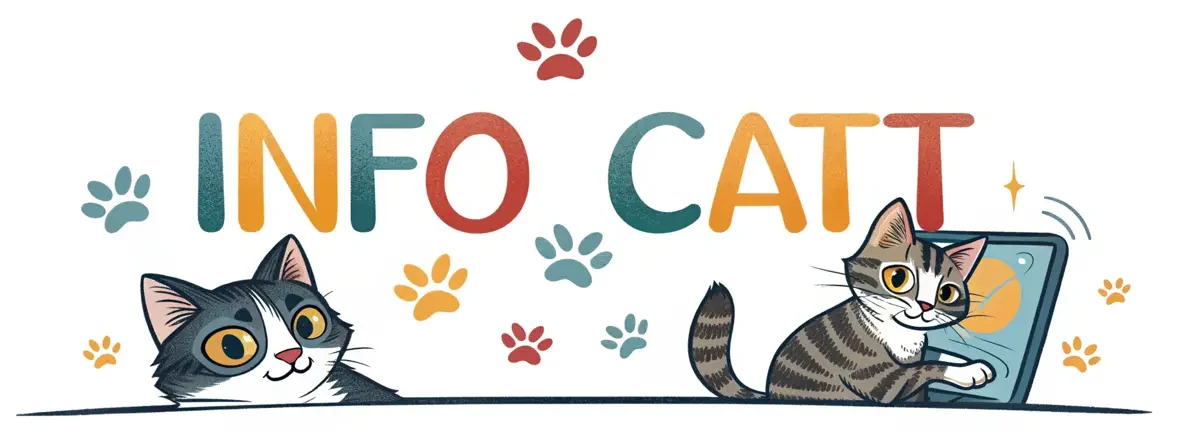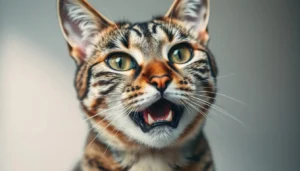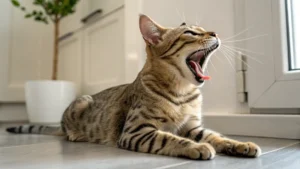Ever wondered why your cat won’t stop meowing? That sound can go from cute to too much when they meow a lot suddenly. Cats have a special way of talking to us through their meows.
Figuring out why your cat meows so much can be like solving a mystery. Each meow means something different, like needing food or attention. Knowing what they’re trying to say can make your bond stronger.
Cats have learned to talk to us in a way their wild ancestors didn’t. They use meows to tell us what they need, want, or how they feel. This special language helps them connect with us better.
Understanding Normal vs. Excessive Cat Vocalization
Cat vocalization is more complex than many pet owners think. Cats use a wide range of meows to communicate. Each meow has its own meaning, helping you connect better with your cat.
Not all cat meows are the same. Cats have a complex language that goes beyond simple sounds. The reasons for meowing can change a lot based on the situation, age, and personality of the cat.
Decoding the Different Types of Cat Meows
Cats send different signals through their meows. Here are some common types:
- Short, high-pitched meows: Usually a greeting or sign of excitement
- Long, drawn-out meows: Often indicate a demand or complaint
- Soft, chirping sounds: Typically a mother cat’s communication with kittens
- Repeated, urgent meows: Could signal hunger or distress
When Meowing Raises Red Flags
While some meowing is normal, constant meowing might mean there’s a problem. Watch for changes in your cat’s meowing patterns. This could be a sign of:
- Physical discomfort
- Stress or anxiety
- Age-related cognitive changes
- Potential medical conditions
The Fascinating Evolution of Feline Communication
Cats have learned to use meowing to talk to humans. Unlike wild cats, domestic cats know meowing gets our attention. This shows how smart and social these animals are.
Remember, every meow tells a story – you just need to learn how to listen.
Common Reasons Behind Frequent Cat Meowing
Learning about cat communication signs can help you figure out why your cat meows a lot. Cats use meowing to show their needs and feelings.
There are a few main reasons why your cat might start meowing more:
- Hunger and Feeding Schedules: Your cat might meow a lot when they’re hungry or want different meal times
- Attention-Seeking Behavior: Some cats meow to get playtime or more interaction with their owners
- Environmental Changes: New pets, furniture changes, or big household shifts can make cats meow more
- Mating Instincts: Unspayed or unneutered cats might meow more during breeding times
Stress can really affect how much your cat meows. Cats might meow more when they’re stressed or anxious. To find out why, watch your cat closely and see if you can spot any changes.
Some cat breeds, like Siamese, are naturally more talkative. They tend to meow more than other breeds.
Remember, every meow tells a story – your job is to listen and understand.
Medical Conditions That May Cause Excessive Meowing
When your cat starts meowing more than usual, it could be a sign of underlying health issues. Can health problems cause a cat to meow a lot? Yes, they can. Cats meow to communicate discomfort, pain, or changes in their health.
Understanding the medical reasons behind excessive meowing can help you address your cat’s needs better. Is it normal for a cat to meow constantly? Not always, as persistent or different meowing can be a sign of trouble.
Age-Related Health Challenges
As cats grow older, they may face various health issues that lead to more meowing:
- Cognitive decline similar to dementia in humans
- Reduced hearing or vision
- Disorientation and confusion
Pain and Discomfort Signals
Cats often meow to express physical discomfort. Possible causes include:
- Arthritis and joint problems
- Dental issues
- Internal infections
- Injuries or muscle strains
Thyroid and Hormonal Problems
Certain hormonal imbalances can lead to increased vocalization. Hyperthyroidism, common in older cats, can cause:
- Increased appetite
- Weight loss
- Excessive meowing
Always consult your veterinarian if you notice sudden changes in your cat’s meowing patterns.
Why Is My Cat Meowing So Much at Night?
Nighttime meowing can be really frustrating for cat owners. Cats meow a lot at night for many reasons. Knowing these can help you find ways to stop the meowing during quiet hours.
Cats are naturally more active at dawn and dusk. This can make them meow more when you’re trying to sleep. Their ancestors hunted at these times. Nocturnal meowing can mean several things:
- Hunger or thirst
- Desire for attention
- Anxiety or discomfort
- Age-related cognitive changes
To stop your cat from meowing at night, try these tips:
- Feed them a consistent evening meal
- Make their sleeping area comfy
- Give them toys to play with before bed
- Check with a vet to rule out health issues
Older cats might meow more at night because of age-related problems. If your cat’s meowing is too much or different, see a vet. They can check for health problems.
Patience and consistent routine are key to managing nighttime meowing.
Understanding your cat’s nighttime meows and fixing any issues can help. This way, you and your cat can both sleep better.
Behavioral Triggers for Increased Vocalization
Understanding cat behavior problems can be tough, like when your cat won’t stop meowing. Cats talk through meowing, and too much of it means they’re upset or need something.
So, what does it mean when cats meow a lot? It’s not just noise. They use their voices to tell us about their feelings and needs.
While excessive meowing is often linked to communication, rapid breathing could be a sign of stress or health issues. Find out more in our guide on why cats breathe fast.
Attention-Seeking Behavior
Cats are experts at getting your attention. If they feel left out, they’ll meow more to:
- Demand food or playtime
- Ask for pets or cuddles
- Show they want to play
“A cat’s meow is a learned behavior specific to talking to humans.” – Feline Behavior Experts
Environmental Changes
Big changes in their world can make cats meow more. This includes:
- Moving to a new home
- Getting new pets
- Changing the furniture
Stress and Anxiety Factors
Cats are very sensitive. Stress can make them meow a lot, caused by:
- Changes in their routine
- Loud noises
- Not enough fun things to do
Knowing these reasons can help you meet your cat’s emotional needs and cut down on too much meowing.
Effective Solutions to Reduce Excessive Meowing
Learning to calm a noisy cat takes patience and smart strategies. If you’re wondering how to stop your cat from meowing, there are effective ways. These methods can help manage your cat’s loud sounds.
First, find out why your cat is meowing so much. Cats talk to us through meows, and knowing what they mean is key. Make a plan that meets their physical and emotional needs.
- Establish a consistent feeding schedule to reduce hunger-related meowing
- Provide interactive toys that stimulate mental engagement
- Set aside dedicated playtime to reduce attention-seeking behavior
- Create a calm environment with predictable routines
Adding fun to your cat’s environment can help a lot. Cats love to play and explore. Try puzzle toys, climbing spots, and windows for them to look out.
Don’t forget to check your cat’s health if they meow a lot. A vet can help find out if there’s a health issue and give advice for your cat.
Remember, patience and consistent training are key to managing your cat’s vocal behaviors.
If your cat meows a lot at night, try to change their behavior slowly. Don’t react to loud meows. Instead, praise them when they’re quiet. This helps them learn to communicate better.
Conclusion
Understanding why your cat meows a lot can change how you connect with them. Cat communication is complex and needs patience and attention. Each meow can tell you about your cat’s needs, feelings, and health.
Listening and watching closely shows that meowing is more than just noise. It’s a way for your cat to say they’re hungry, want attention, or are feeling sick. By understanding these signals, you can solve problems and make your home happier.
Every cat is different, with their own way of talking. What works for one cat might not work for another. Paying close attention to your cat’s habits and talking to a vet if needed is key. This way, you’ll grow closer and make sure your cat feels understood and loved.
Figuring out why your cat meows a lot is a journey of love and understanding. By embracing this journey, you’ll build a stronger bond with your cat that goes beyond words.
FAQ
Why does my cat meow so much all of a sudden?
Cats meow for many reasons, such as health issues, stress, or changes in their environment. They might be in pain, anxious, or just want more attention from you. Watch how they meow and talk to your vet if it’s not normal.
Is it normal for a cat to meow constantly?
No, constant meowing is not normal. It could mean they’re hungry, in pain, stressed, or need attention. Some cats, like Siamese, are more talkative. But too much meowing usually means they need something from you.
What does excessive meowing mean in cats?
Excessive meowing means your cat is trying to tell you something. It could be about hunger, pain, stress, or needing attention. Cats meow to communicate with us, so if they’re meowing a lot, it’s usually because they’re trying to tell us something important.
How do I get my cat to stop meowing?
To stop excessive meowing, try these steps:
– Check with your vet to rule out health issues
– Maintain a regular routine for feeding and playing
– Give them mental stimulation with toys
– Reduce stress and anxiety
– Don’t always respond to every meow
– Add enrichment like climbing trees or perches
Can health problems cause a cat to meow a lot?
Yes, many health problems can lead to more meowing. This includes thyroid issues, pain, cognitive problems in older cats, and sensory changes. If your cat’s meowing changes suddenly or lasts a lot, see your vet.
Why does my cat meow so much at night?
Nighttime meowing can be due to hunger, thirst, anxiety, or loneliness. It could also be because of age-related changes or disrupted sleep. Make sure your cat has food, water, and a comfortable place to sleep. Consider special accommodations for older cats.



